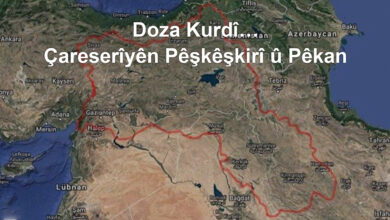Amidst a state of international and regional competition in the region of northern and eastern Syria, after the partial withdrawal of the American forces in October 2019, conflicts and tensions between international and regional powers in this region emerged from the US-Russian conflict. A conflict of visions between the Autonomous Administration and the Syrian regime, and the ongoing Turkish threat to launch military operations in the region.
Syria is considered the focal point in defining the features of the region in the future, as the presence of various international and regional powers increases in it, and the impact of the Syrian file on the historical mutual relations between these countries, and the interaction of these forces with the Syrian event because of their knowledge of Syria’s political and geographical importance on the basis of the fateful presence and strategies and drawing future balances New. In light of this reality, US President Donald Trump recently announced, in a statement to the White House, the extension of the state of emergency in Syria, saying: “The situation in Syria, especially the measures taken by the Turkish government to implement it. A military attack on northeastern Syria undermines the campaign aimed at rolling back. The Islamic State is endangering civilians and continues to pose an extraordinary threat to the national security and foreign policy of the United States, adding: “For this reason, the national emergency declared on October 14, 2019 must remain in effect after October 14, 2020 for a year.”
The extension of the state of emergency relates to the developments that took place after the partial withdrawal from northern Syria and the concentration in the eastern region adjacent to the Iraqi border, after Trump announced in November 2018 that his country would withdraw from Syria completely after implementing its goals to eliminate the terrorist organization ISIS. In this context, as a result of the withdrawal from some areas, the United States realized the consequences of this step and the changes that may occur and affect the depth of the American objectives in the region of combating terrorism, confronting Iran and the conflict with Russia over various files, as this withdrawal led to:
1–The security stability was hit due to Turkey’s occupation of Gerry Spi and Sri Kane. This withdrawal also reinforced the fears of many countries again about the emergence of ISIS in the region, which threatened the world for several years, and ISIS sleeper cells in the region were intensively active after the Turkish invasion of the region.
– 2-Strengthening Russia’s role and increasing its influence in Syria, after finding a foothold in the region, according to the security agreement between the Syrian Democratic Forces and Russia.
– 3-Giving vitality to the Iranian role and strengthening its political and military position in Syria, at a time when the United States of America placed Iranian expansionism among its priorities, especially since Iran is pressing through the political and popular base on America to get out of Iraq, and on the other hand, this withdrawal led to an increase in influence Iranians in the east of the Euphrates due to the entry of militias of the Syrian regime and Iran to this region after the Turkish occupation.
– 4-Internationalizing the situation between (Russia, Turkey, and Iran) and reaching a further understanding between them about the situation in the east of the Euphrates in light of their absolute rejection of the political situation living in this region, after its liberation from ISIS, and that these understandings would lead to consolidation in The relationship between the three parties, forcing Turkey to rotate in the Russian astronomy, which affects the US-Turkish relationship, as Erdogan’s goals are in conflict with the American goals in Syria.
These and other reasons made the United States of America extend the state of emergency in Syria, that is, it will remain for another year.
Trump’s extension of the state of emergency in Syria comes at a time when the Kurdish-Kurdish dialogue is witnessing remarkable progress and the return of Russian statements that the presence of American forces in Syria is illegal and the increase in “patrol” friction between them, especially in some areas that Russia controlled after the partial withdrawal of American forces during the recent Turkish invasion ( Derek (Malikiya) and the areas where the American forces are still present, where Russia aspires, after finding a foothold in the Autonomous Administration areas, to enter its companies to invest in the oil field in eastern Qamishlo, which are the fields not covered by the contract signed between the Autonomous Administration and the American oil company Which would strengthen the system and offset part of the military cost of it in Syria.
14 Here, it is possible to anticipate what variables that may happen in northern and eastern Syria may affect the entire Syrian geopolitics due to the continuation of the state of emergency, and the United States aims through this to reposition its forces in the areas from which it withdrew during the recent Turkish invasion, as it brought about 100 soldiers Of the Marines and Bradley fighting vehicles, and deployed a short and medium-range “Sentinel” radar, and supports the Kurdish-Kurdish dialogue, which, if successful, may lead to the formation of a new opposition between Dam and the so-called Syrian Coalition, and this requires Turkish approval.
In order for the United States to win both “Turkey and the Autonomous Administration” in the long term, it may work in the next stage by pressuring Turkey to accept its policy in Syria and open the door to negotiations between the two parties to reach a peace agreement, because political stability in this region will facilitate America’s investment process. ” Delta Crescent Energy. ” It will push the Russians to put more pressure on the Autonomous Administration and continue to try to threaten its withdrawal to open the way for a new Turkish invasion, or it will pressure the regime to open the door to negotiations with a blockade and to make concessions to reach an agreement that allows Russian economic and military penetration in the region, and cuts the way for the United States to uniqueness in the region While realizing the importance of the Kurdish presence in the region and losing them to the United States, Russia will try to pressure the Syrian Democratic Forces to seize part of the oil wealth in the east of the Euphrates, and try to gain a foothold in the oil region before the American company Delta begins to restore the oil fields And operating it, as it realizes that activating the oil agreement means that the American withdrawal decision has become unlikely, and in the event that this American policy succeeds, and Russia has failed to cause a rift in the US-Turkish relations and has not succeeded in pushing Turkey to a new military operation, even if it is limited, especially if the United States is It has set red lines towards Turkey after it was given the green light to invade the regions of Girê Spi and Sri Kane, and thus it will be the beginning of the emergence of vinegar A Russian-Turkish affliction that will be reflected in the future on Idlib.
Analysis section






